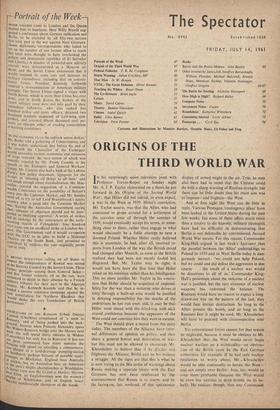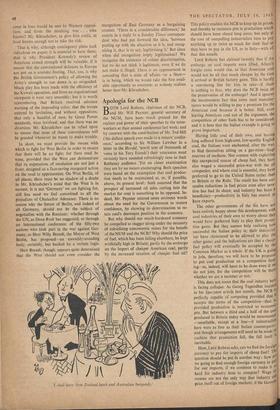ORIGINS OF THE THIRD WORLD WAR
I N his surprisingly quiet television joust with Professor Trevor-Roper on Sunday night Mr. A. J. P. Taylor elaborated on a thesis he put forward in his Origins of the .Second World War: that Hitler did not intend, or even expect, a war in the West in 1939. Hitler's conviction, Mr. Taylor asserts, was that the Allies, who had continued to grope around for a 'settlement of the corridor issue all through the summer of 1939, would eventually accept his terms, or some- thing close to them, rather than engage in what would obviously be a futile attempt to save a doomed Poland. Whether Hitler really believed this is uncertain; he had, after all, received re- ports from London of the way the British mood had changed after Munich, as soon as the British realised they had been not merely fooled but disgraced. But, Mr. Taylor may be right; it would not have been the first time that Hitler relied on his intuition rather.than his Intelligence. This no more justifies Mr. Taylor in his convic- tion that Hitler should be-acquitted of responsi- bility for the war than a motorist who drives at sixty through a built-up area would be justified in denying responsibility for the deaths. of the pedestrians he has run over; still, it may be that Hitler went ahead with the blitzkreig with such crazed confidence because the appeasers of the West could not convince him they were in earnest.
The West should draw a Moral from this story today. The members of the Alliance have inter- nal differences of opinion on policy, and they share a general horror and detestation of war: but this must not be allowed to encourage Mr Khrushchev to believe• that if he dlv:Lles ar,d frightens the Alliance,' Berlin can be his without a struggle. All the signs are that this is what he is now trying to do. His series of warnings about Russia making a separate treaty with the East Germans has now been reinforced by the announcement that Russia is to rearm, and by the laying-on, last weekend, of that spectacular display of armed might in the air. True, he may also have had in mind that the Chinese could do with a sharp warning of Russian strength; but there c,an be little doubt that his main aim was to impress—and frighten—the West.
And at first sight the West can do little in reply. Various Pentagon 'contingency plans' have been leaked in the United States during the past few weeks, but none of them offers much more than a resolve to die bravely; military strategists have had no difficulty in 'demonstrating that Berlin is not defensible by conventional. Second World War means. For this reason, Commander King-Hall argued in last week's Spectator „that the parallel between the Allies' undertakings to Poland in 1939 and to West Berlin today is dan- gerously inexact: 'we could not help Poland, but we could and did defeat the aggression in due course . . the result of a nuclear war would be disastrous to all of us.' Commander King- Hall's pessimism about ,the outcome of .a nuclear war is justified, but the very existence of nuclear weapons has redressed the balance. The Russians would haveno reason to expect a long- drawn-out war on the pattern of the last; they would face instant destruction. So long as the Allies possess the bomb, and so long as the Russians fear it might be used, Mr. Khrushchev will have to proceed with circumspection over Berlin.
Yet conventional forces cannot for that reason be neglected. because it must be obvious to Mr. Khrushchev that the West would never begin nuclear warfare on a technicality—on obstruc- Con of the Berlin route by the East German authorities, for example. If he had only nuclear retaliation to worry about, Mr.. Khrushchev would be 'able continually to harass the West— and not simply over Berlin : Iran, say, would be even more profitable (because the West would be even less anxious to drop bombs on its be- half). He realises, though, that any Communist coup in Iran would be met by Western opposi- tion; and from the resulting war . . . who knows? Mr. Khrushchev, to give him credit, at least knows enough not to take the risk.
That is why, although contingency plans look ridiculous on paper, it is essential to have them; that is why President Kennedy's review of American armed strength will be valuable, if it means that the conventional defences in Europe are put on a sounder footing. That, too, is why the British Government's policy of allowing the Army's strength to run down is so misguided. Much play has been made with the efficiency of the Kuwait operation, and from an organisational viewpoint it went very smoothly; but it is worth remembering that Britain received advance warning of the impending crisis; that the troops entered by invitation, and without opposition; that only a handful of men, by Great Power standards, were involved; and that there was no diversion. Mr. Khrushchev can be relied upon to ensure that none of these conveniences will be granted whenever he wants to make trouble.
In short, we must provide the means with which to fight for West Berlin in order to ensure that there will be no fight; for there need be none, provided that the West can demonstrate that its expressions of resolution are not just a front, designed as a face-saving rearguard action on the road to appeasement. On West Berlin, of all places, there must be no shadow of a doubt in Mr. Khrushchev's mind that the West is in earnest. It is not 'Germany' we are fighting for, still less need we feel committed to all the prejudices of Chancellor Adenauer. There is no reason why the future of Berlin, and indeed of all Germany, should not be the subject of negotiation with the Russians: whether through the UN, as Dean Rusk has suggested; or through an international conference of the fifty-two nations who took part in the war against Ger- many, as Herr Willy Brandt, the Mayor of West Berlin, has proposed—an unwieldy-sounding body, certainly, but backed by a certain logic.
Herr Brandt, though, appears quite determined that the West should not even consider the recognition of East Germany as a bargaining counter. 'There is a considerable difference,' he asserts in a reply to a Sunday Times correspon- dent who had put forward the idea, 'between putting up with the situation as it is, and recog- nising it, that is to say, legitimising it.' But since when did recognition imply legitimation? We recognise the existence of colour discrimination, but we do not think it legitimate, even if we do not make it illegal. There is no appeasement in conceding that a state of affairs—or a State— is in being, which we would take the first avail- able opportunity to overturn; as nobody realises better than Mr. Khrushchev.



































 Previous page
Previous page